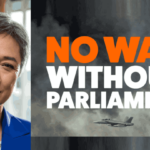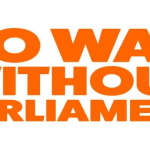Labor Refuses War Powers Reform, as Albanese Retains Decision to Enter China Conflict

Prior to being elected, federal Labor twice promised to hold an inquiry into whether the decision to enter into overseas wars should remain one for the PM and a handful of select ministers or, alternatively, be a decision made by the parliament, which, in turn, triggers the entire constituency.
The ability to make this decision is called war powers. Currently, this is the domain of the National Security Committee, which is a war cabinet comprised of Anthony Albanese, Richard Marles, Penny Wong, Jim Chalmers, Chris Bowen, Mark Dreyfus, Clare O’Neil, Katy Gallagher and Pat Conroy.
Reforming this centuries-old British royal practice has been a concern of the Australian Greens, and the Democrats before it, going back to the mid-1980s. And right now, there’s a heightened urgency around this matter due to an escalation in the build-up to a US-led war against China.
The details of the AUKUS enhanced security agreement were released on 14 March. This includes our nation acquiring eight nuclear-powered submarines by 2055. And to tide us over prior to that, the US and the UK will be establishing a joint force of attack submarines in Australia by 2027.
However, Greens Senator Jordon Steele-John told Sydney Criminal Lawyers last week that “the inquiry is a managed stageshow” and he could “be absolutely sure that both parties will not support the reforms backed by the community”.
And the senator’s supposition was proven correct on Friday, as the War Powers Inquiry into International Armed Conflict Decision-Making announced that this “most significant and serious institutional power” should remain “fundamentally a prerogative of the executive”.
Maintaining ultimate control
“The first recommendation confirms our worst fears – it reaffirms the status quo by insisting that decisions regarding armed conflict are fundamentally up to the PM and the executive,” Australians for War Powers Reform (AWPR) president Dr Alison Broinowski said, in a statement on Friday.
“This means that MPs and senators will continue to have no right to vote on a war decision before troops are sent overseas,” she continued. “This means that the PM and a small group of ministers will still make the decisions just as John Howard did in 2003 with his ‘captain’s call’ on going to Iraq”.
The Joint Standing Committee on Foreign Affairs, Defence and Trade report into war powers states that while it recommends the PM maintains the powers, it acknowledges the role of parliament in considering such decisions and the value of improving transparency and accountability around them.
In dissenting, the Greens on committee called for the arrangement that’s seen Australia follow the US into eight foreign wars since World War Two be reformed in line with community want.
While a recent peace meeting in Marrickville drew a correlation between the lies propagated about weapons of mass destruction that were used to lead our nation into a war against Iraq twenty years ago and stories now being told in the media about the military threat that China poses Australia.
“The sad fact is that even if the Albanese government accepted all of the committee’s recommendations, Australia could still be sent to a ‘war of choice’ overseas and our elected representatives – MPs and senators – would have almost no say,” Broinowski underscored.
Further preparations
Meanwhile, the Independent and Peaceful Australia Network (IPAN) sent out an email on Sunday evening, drawing attention to the Albanese government’s 9 March release of a consultation paper regarding a planned overhaul of the Defence Act 1903 (Cth), with a related call for submissions.
“After reading the consultation paper it is clear there are ambiguous but worrying requests regarding reforming defence legislation in this consultation process,” said IPAN chair Annette Brownlie.
The consultation paper outlines that the nation needs to reform its defence laws due to “a changing strategic environment”, which is code for a rising China, in terms of its military defence capabilities, security around these and interoperability between our defence forces and those of our allies.
“AWPR had great hopes that after more than a decade of Coalition rule, the new Albanese government would bring progressive change to defence and foreign affairs,” said Dr Broinowski last Friday, as she conveyed the sentiment of many on a range of 2023 federal Labor policy settings.
“But today’s decision, along with the AUKUS agreement and the decision to spend an obscene amount of money on nuclear submarines, have well and truly dashed those hopes.”







